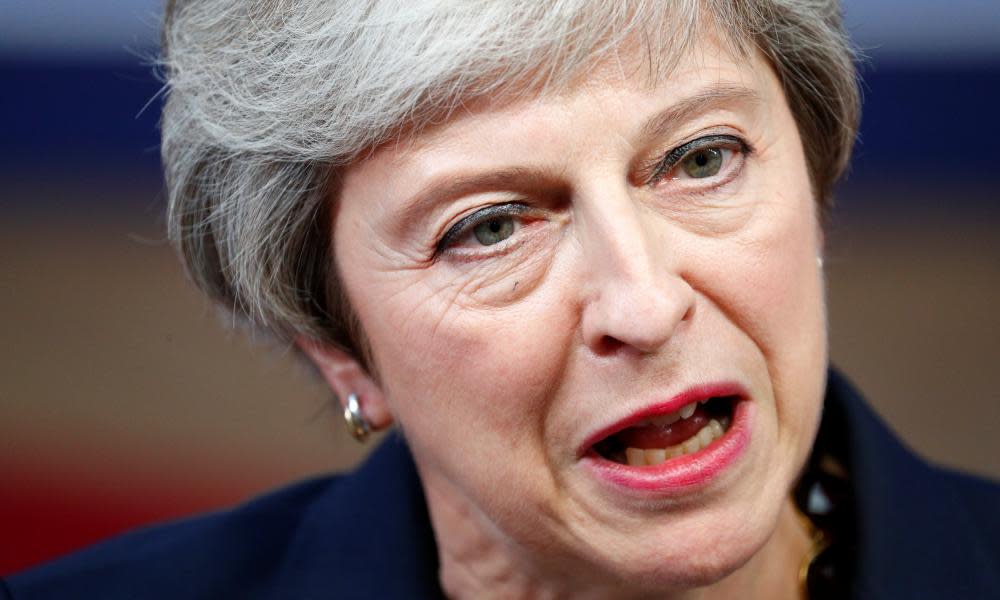Sweet Jeremy rides to Brexit-broken Theresa's rescue

Theresa May checked her reflection in the mirror. No love lost there. She still hated herself. Hated the person she had become, hated the job she was doing. When she had first become prime minister, she had felt almost complete. But now she was little more than a hollowed-out shell, almost unrecognisable even to herself.
Brexit had poisoned her from within. She knew it was a terrible mistake – she had always known that – and everything she touched now turned to dust around her. She wasn’t even making the best of a bad job. She was doing a bad job badly. Most mornings she would lie under the duvet, willing time to stand still. She carried on merely because it was less humiliating than not carrying on. Stubbornness disguised as a misplaced sense of duty.
Her mood didn’t improve when she walked into the Commons for prime minister’s questions. May looked at her cabinet, sitting with their heads down on the front bench, trying to avoid catching her eye. Not a real friend in sight. Just varying degrees of enemy. Ministers who had so little respect for her they had even taken to having their own private cabinet meetings without her. People who would gladly knife her in a heartbeat if they could only agree on her replacement.
Then she looked across the dispatch box and relaxed. There, as he always was at this time of the week, was Jeremy Corbyn. Dear, dear Jeremy. Sweet Jeremy. A man who understood how broken she was and went out of his way not to show her up. The perfect gentleman who was prepared to fight incompetence with incompetence.
The Labour leader began by asking if the Chequers deal was dead, as May hadn’t mentioned it for a while. “Er, no,” she replied cagily. It just wasn’t particularly alive. An ex-deal. The deal that must not be named. The C word. Corbyn let that go. No need to open old wounds. Instead, he moved on to Northern Ireland. Did she accept that she had already signed up to a Northern Ireland backstop agreement last December?
For a brief moment, the prime minister appeared rattled, defaulting to her usual panic waffle setting. “As I said to this house on Monday,” she babbled, “we have made good progress on aspects of the future relationship based on the plan that we put forward in July. We then said that there could be some Northern Ireland-specific solutions – there are already Northern Ireland-specific arrangements that take place – and that failing that, we would look at those UK-wide solutions.”
It was all nonsense. Meaningless. She knew it and everyone else knew it. Another Labour leader might have eviscerated her. Hell, all of the MPs on her own benches – well, perhaps not David Davis, as he was in a stupidity category all of his own – would have taken her apart. Of course she had signed up to a Northern Ireland backstop in December. She just hadn’t read it very carefully. And her recent attempts to blame the EU for her efforts to renegotiate fooled no one. No wonder they wanted a backstop to a backstop. A backstop to the government’s idiocy.
But Jeremy – bless him – just nodded and took her at her word. As if she had just pronounced an eternal truth. No quibbles. Barely the raising of an eyebrow. Corbyn’s unerring, laser-like ability to let her off the hook had struck again. He even allowed her to get away with insisting she was acting in the national interest. She blew him a kiss and mouthed a thank you. It was almost as if the Labour leader had made it his personal mission to keep her in a job. The rest of PMQs – even with 12 more Brexit questions – sailed by.
Then it was a plane to Brussels for the EU council. A less hostile environment than the Tory party but hardly a love-in. Still, it made a change to be abused in a variety of languages she didn’t understand. The dread set in once more and her pupils dilated as she prepared to greet the press on the way in. The words came. Just not in the right order as the barriers of meaning and syntax were broken. She was really looking forward to discussing security and global issues.
Someone reminded her about Brexit. “Oh that,” she said. We were making good progress, great progress, the best possible progress. Things had never been better and she hoped to make more progress. But what was the plan? May stammered incoherently. The plan was the same as it had always been. To try to get through to bedtime more or less in one piece. And to hope she woke up somewhere else entirely.

 Yahoo News
Yahoo News 
